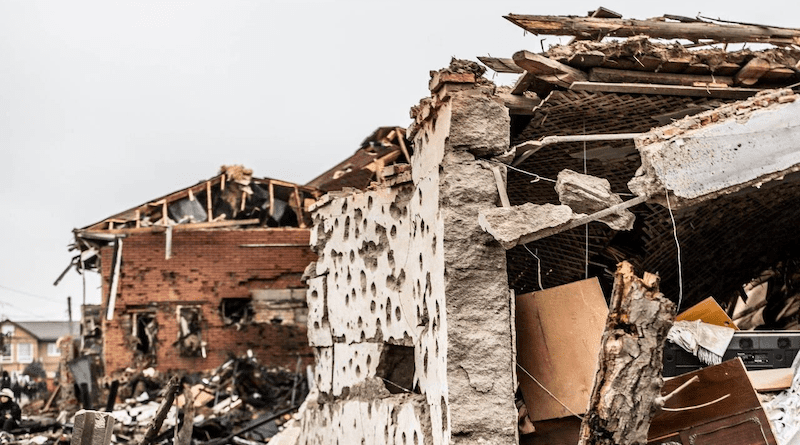Ukraine To Deliver Grain To Hungry Countries
By VOA
Ukrainian President Volodymyr Zelenskyy hosted a summit in Kyiv to mark the 90th anniversary of Holodomor, or the Great Famine, a man-made famine engineered by dictator Josef Stalin during the Soviet era in 1932 and 1933.
In his address, Zelenskyy said 4 million to 8 million Ukrainians died during the famine.
In a tweet, the head of the Office of the President of Ukraine, Andriy Yermak, called the historic event, “a genocide of the Ukrainian people,” and said Russia must be held accountable for its mass crimes.
The summit launched Zelenskyy’s “Grain from Ukraine” initiative, exporting grain to countries most afflicted by famine and drought. In his address, Zelenskyy said that Ukraine is committed to fulfill its grain and other foodstuff exports to the global market.
“In general, under the Grain from Ukraine program, by the end of next spring, we plan to send at least 60 vessels from our ports – at least 10 per month – to countries at risk of famine and drought. This is Ethiopia, these are Sudan, South Sudan, Somalia, Yemen, Congo, Kenya, Nigeria.”
The Ukrainian leader said the initiative exemplified Kyiv’s commitment to global food security.
The Kremlin had said Ukraine’s Black Sea exports during the war have not been reaching the most vulnerable countries.
Zelenskyy said Kyiv had raised around $150 million from more than 20 countries and the European Union to export grain to countries including Ethiopia, Sudan, South Sudan, Somalia and Yemen.
Meanwhile, Ukrainian Prime Minister Denys Shmyhal met with his Lithuanian and Polish counterparts in Kyiv Saturday. The three prime ministers of the Lublin Triangle affirmed their commitment to work together against Russian aggression.
In a joint statement, the participants condemned the “systemic war crimes committed by Russia’s forces in regions of Ukraine, including deliberate, indiscriminate and disproportionate attacks against the civilian population and elements of the civilian infrastructure.”
Electricity has been restored in the southern Ukrainian city of Kherson after the latest Russian barrage on the city that killed many and damaged the power infrastructure.
“First we are supplying power to the city’s critical infrastructure and then immediately to household consumers,” Kyrylo Tymoshenko, deputy head of Ukraine’s presidential administration, wrote on the Telegram messaging app.
According to The Associated Press, Russian attacks on the city killed 15 civilians from November 20-25 and injured another 35. The destruction has triggered an exodus of civilians from the city.
Russian forces unleashed yet another devastating missile barrage against Ukraine Wednesday, causing Kyiv’s biggest outages since the invasion began nine months ago.
Ukrainian authorities have worked to restore power throughout the country, making some progress to repair the electric grid following Russian missile attacks, but are still unable to immediately help millions of Ukrainians in the dark.
Ukraine said the attacks are clearly intended to harm civilians, making them a war crime. Russia has said it targets only military-linked infrastructure and has blamed Kyiv for the blackouts.
The weather forecast across much of Ukraine for the coming days calls for rain and snow and temperatures in the single digits, Celsius.
Zelenskyy pleaded with people to cut back on the amount of energy they use.
“If there is electricity, this doesn’t mean you can turn on several powerful electrical appliances at once,” he said.
NATO chief Jens Stoltenberg said Friday that Russian missile attacks on civilian infrastructure are leaving the country’s population without heat, lights and food in a “horrific start” to the winter.
Speaking in Brussels, Stoltenberg said Russian President Vladimir Putin “is failing in Ukraine, and he is responding with more brutality.”
Stoltenberg said NATO would continue to stand with Ukraine for as long as it takes. He said the members of the alliance have been “providing unprecedented military support” and other aid for Ukraine.
NATO countries have also been delivering fuel, generators, medical supplies, winter equipment and drone-jamming devices, he said, but added that more will be needed as winter closes in, particularly as Russia continues to target Ukraine’s energy infrastructure.
British Foreign Secretary James Cleverly announced a new aid package for Ukraine during his visit to Kyiv Friday.
The package — worth about $60 million, according to Britain — includes radar and other technology to counter the Iranian-supplied exploding drones that Russia has used against Ukrainian targets, especially the power grid. The aid comes on top of a delivery of more than 1,000 surface-to-air missiles that Britain announced earlier in November.
“Words are not enough. Words won’t keep the lights on this winter. Words won’t defend against Russian missiles,” Cleverly said in a tweet about the military aid. He added that “as winter sets in, Russia is continuing to try and break Ukrainian resolve through its brutal attacks on civilians, hospitals, and energy infrastructure.”
France will send 100 high-powered generators to Ukraine to help people get through the winter, French Foreign Minister Catherine Colonna also announced Friday. She said Russia is “weaponizing” winter and plunging Ukraine’s civilian population into hardship.
In addition to European aid, the United Nations humanitarian office said the global body and its partners were sending hundreds of generators to Ukraine to help Kyiv in its efforts to keep people warm and maintain essential services, such as health care. The World Health Organization said it is sending generators to hospitals in Ukraine.
U.N. High Commissioner for Human Rights Volker Türk said Friday he was shocked at the depth of civilian suffering caused by the bombing, amid broader allegations of abuses.
“Millions are being plunged into extreme hardship and appalling conditions of life by these strikes,”he said in a statement Friday.
“Taken as a whole, this raises serious problems under international humanitarian law, which requires a concrete and direct military advantage for each object attacked,” he said.
Radio Free Europe/Radio Liberty contributed to this report.

